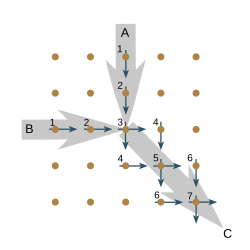| Author | Konrad Zuse |
|---|---|
| Original title | Rechnender Raum |
| Language | German |
| Subject | Automata theory |
| Genre | Non-fiction |
Publication date | 1969 |
| Publication place | Germany |

Calculating Space (German : Rechnender Raum) is Konrad Zuse's 1969 book on automata theory. He proposed that all processes in the universe are computational. [2] This view is known today as the simulation hypothesis, digital philosophy, digital physics or pancomputationalism. [3] Zuse proposed that the universe is being computed by some sort of cellular automaton or other discrete computing machinery, [2] challenging the long-held view that some physical laws are continuous by nature. He focused on cellular automata as a possible substrate of the computation and pointed out that the classical notions of entropy and its growth do not make sense in deterministically computed universes.